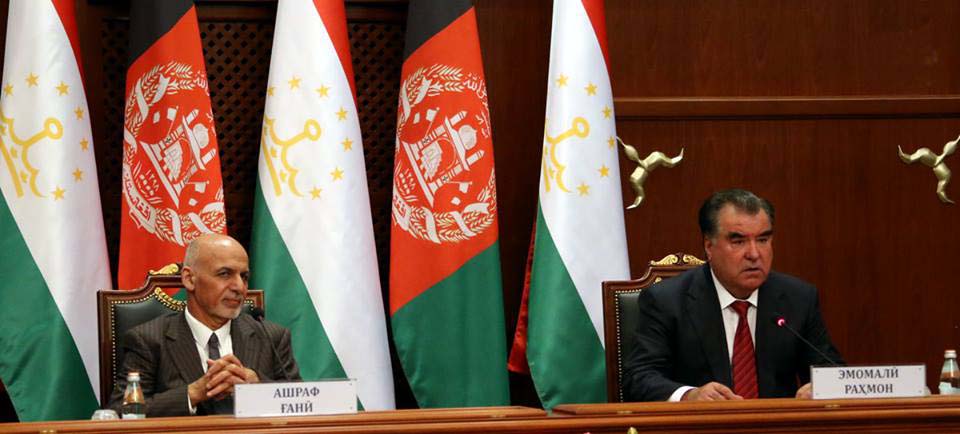Afghan-Tajik ties; the past and future
Based on official invitation by Emam Ali Rahman, the Afghan President Ashraf Ghani visited Tajikistan on Tuesday May 10, 2016. Since the formation of the National Unity Government (NUG) in Afghanistan, this is the first visit to Tajikistan by Ashraf Ghani.
Later, the Afghan Chief Executive Officer Dr. Abdullah Abdullah also visited Tajikistan to participate in inauguration ceremony of the Central Asia-South Asia (CASA-1000) power project.
The background, present and future of the Afghan-Tajik relations and the significance of Tajikistan in the Afghan Foreign Policy are the issues that will be analyzed here.
The background of Afghan-Tajik ties
The fact that Afghanistan and Tajikistan share common language, ethnic and culture has connected them to each other. The two countries have had close relations throughout history and in various historical periods both were under same sovereignty; for instance during Great Khurasan and in some Islamic periods like Ghaznawi period.
Afghans had close relations with Tajikistan during Ahmad Shah Baba reign. Later in 20th century, Amir Habibullah Khan, Amir Amanullah Khan and Mahmood Tarzi assisted Central Asian Muslims in their uprising against Russians, which are commonly known as ‘Basmachi’ movement.
After the failure of their uprising, the Central Asian Emirates were coming under Russian control one after another; and until 1991 all these Muslim nations were under Soviet Union control. Kabul had kept its cultural ties with Dushanbe and played its role in reviving Persian terms; because based on the Soviet Union Ideology; Persian terms had been replaced with Russian terms.
After the success of Afghan Jihad against Russia, Tajikistan was able to announce its independence on May 9, 1991 and Afghanistan recognized its independence on September 12, 1991. But after the independence, Tajikistan witnessed a bloody civil war which pushed tens of thousands of Tajik migrants toward Afghanistan. The Tajik Civil War ended in 1997 with the mediation of United Nations, Iran and Afghanistan.
At that time, Taliban and Northern Alliance fought against each other in Afghanistan; and Tajikistan backed one of the fighting sides (Northern Alliance).
The Afghan-Tajik ties after 2001
The Afghan and Tajik officials have paid fewer visits to each other’s countries after 2001 compared to other neighbor countries, but generally the Afghan-Tajik relations were normal and better then.
In this period, besides common culture, history and language some economic, energy, trade and transit cooperation were also the subject of discussions. For instance the five nation railway, CASA-1000 power project, exportation of electricity from Tajikistan to Afghanistan, transit through Afghanistan to Pakistan and etc.
The NUG and Kabul-Dushanbe Relations
Neighbors play the most significant role in Ghani’s foreign policy; but China, Pakistan, Turkmenistan and Iran seemed to be more important for Ghani. However, Afghanistan had better relations with Tajikistan compared to Uzbekistan.
The Afghan President went to Tajikistan on a two day trip and met Tajik President, Prime Minister and head of Tajik Parliament.
Tajikistan is concerned about the growth of Narcotics and extremism in Afghanistan in the past two decades. That is why the emergence of ISIS and insecurity in northern Afghanistan were part of discussion between officials of both countries. Besides that the two sided discussed about CASA-1000 power project which was officially inaugurated last week. This project exports 1300 megawatts of electricity from Central Asia to Afghanistan and Pakistan which in addition to meet the electricity demands of Afghanistan, adds 30 to 40 million dollars to Afghanistan’s income annually.
The significance of Dushanbe in Kabul’s foreign policy
Tajikistan has an important role in the Afghan foreign policy for the following economic reasons.
- Transit and Trade: Afghanistan and Tajikistan are both landlocked countries and rely on each other for transit. Although Tajikistan has close relations with Russia and is often under Russian influence; it is still trying to trade and transit through Afghanistan-Pakistan and Afghanistan-Iran. Due to its deteriorated relations with Uzbekistan transit through Afghanistan is now very important for Tajikistan.
In 1384 the Tajik President and Pakistani Prime Minister Mir Zafarullah Khan Jamali agreed on building two roads to connect Tajikistan and Pakistan through Afghanistan. The first road was planned to pass through Dushanbe, Kunduz, Kabul, Jalalabad and Peshawar and the second road was planned to connect Chatral through Wakhan; but in this regard practical steps are yet to be taken.
Besides that, the agreement on five nation railway has also been signed which will connect China through Afghanistan and Tajikistan to Iran. Building another railway that would connect Turkmenistan through Afghanistan to Tajikistan and China is also under consideration.
In 2010, due to Afghanistan-Pakistan Transit Agreement (APTA) Pakistan was allowed to trade with Tajikistan (Central Asia) through Afghanistan; but later in 2015, since Pakistan did not allow Afghanistan to trade with India through Wagah boarder the agreement was canceled.
- Energy: for the following two factors energy is also important:
First: internal power generation does not supply Afghanistan’s needed energy; therefore it imports electricity from neighborhood countries including Tajikistan. Besides that by TUTAP and CASA-1000 power project, Tajikistan exports electricity through Afghanistan to Pakistan.
Second: Amu River is border between both countries. In Amu basin there are vast oil and gas reserves which are the common property of both countries.

